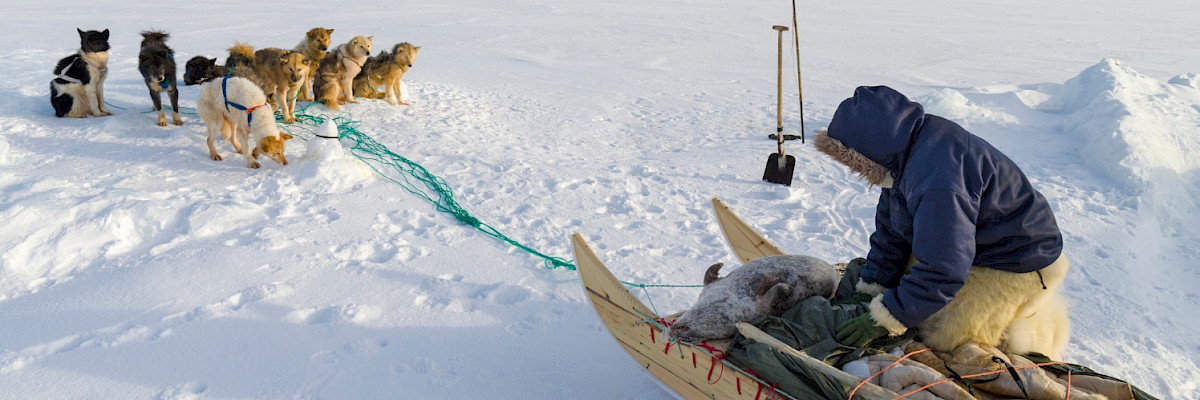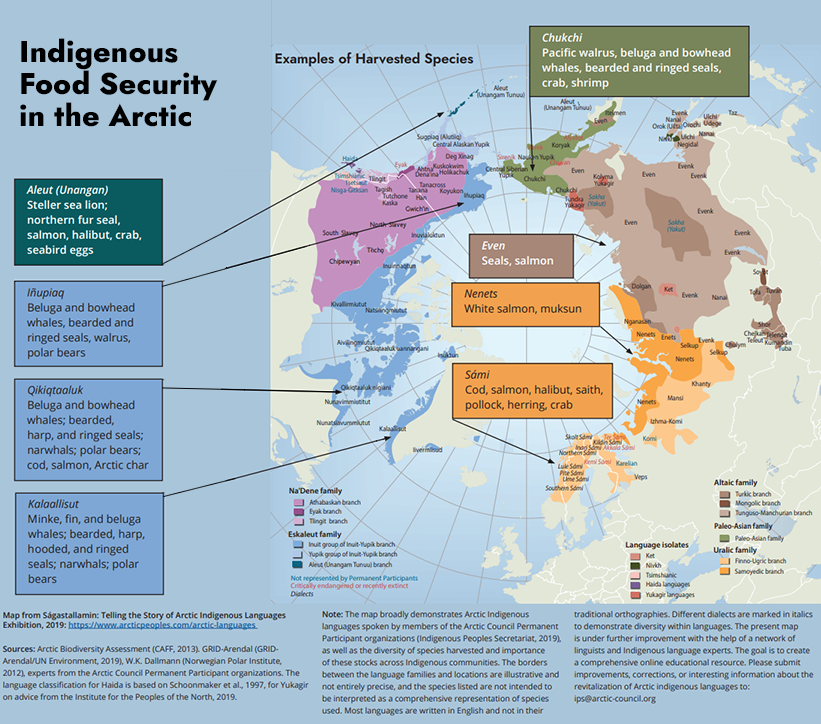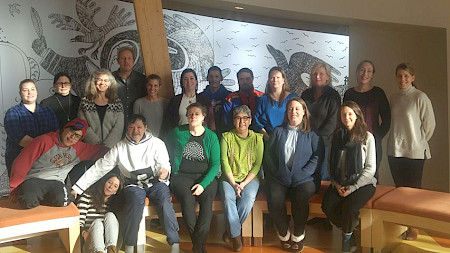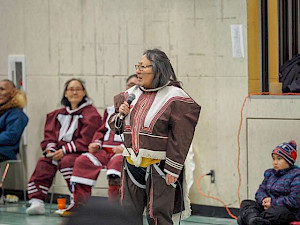
Indigenous Peoples and MPAs
In 2021, PAME approved the "Indigenous Food Security in the Arctic" Information Brief which focuses on how climate change affects Arctic Indigenous food systems, in particular resources, culture, and health tied to marine environments, and highlights examples of adaptive responses in ocean management.
Rapid social and environmental change in the Arctic—including climate change—affect the health and well-being of millions of people and animals that call the Arctic home.1 To understand and manage
these impacts effectively, one needs to look at the ecosystem as a whole for a healthy environment, healthy humans, and healthy animals1 – a conceptual framework often referred to as One Health.
Food security can be an important indicator of ecosystem health and a major determinant of health among Indigenous Peoples. Indigenous communities rely on plants and animals from their environment
(often termed “traditional,” “wild,” or “country” foods), supplemented by imported store-bought food. This use of natural resources is a central part of Indigenous cultures. However, rapid climate change is
drastically changing the physical dynamics of the environment, and consequently affecting acquisition of traditional foods.
Major environmental changes are linked to the warming Arctic, with rapid deterioration of the Arctic sea ice ecosystem among the most drastic effects. Such changes are altering the availability and accessibility
of traditionally harvested species, with consequences to health and cultural wellbeing. The number and types of harvested species, as well as hunting and storage methods, vary by region, culture, and community.
While understanding these differences is important for considering the potential climate change consequences for and adaptation needs of each community, several common themes are outlined in this information brief.

“The two most important parts of our food security were the availability of the animals and the hunter’s ability to hunt. Over the past hundred years, this has changed.”
—Maggie Emudluk, Vice-President, Kativik Regional Government, Canada
 Exploring ways to support Indigenous/Local involvement in, and Indigenous/Local led, marine protection in the circumpolar Arctic Ocean
Exploring ways to support Indigenous/Local involvement in, and Indigenous/Local led, marine protection in the circumpolar Arctic Ocean
March 19-21, 2019 - Cambridge Bay, Nunavut, Canada
Click here to download the Workshop Report.
Click here to download the agenda. Aim:
Aim:
The aim of the workshop was to develop our understanding of the state of Indigenous involvement in, and Indigenous led, marine protection in the circumpolar Arctic Ocean. Workshop participants explored and developed their understanding of Indigenous, Traditional and Local Knowledge as a foundational element in MPA and MPA network design and management, and identify ways to support a spectrum of Indigenous involvement in marine protection, including a community of information exchange.
| Name of presentation | Presenter | Download |
| IUCN Protected Area Definition and Standards | Mike Wong, International Union for the Conservation of Nature (IUCN) | Download |
| Ikaarvik: Inuit youth bridging research and their communities in a changing Arctic | Shelly Elverum and Gibson Porter, Ocean Wise, Ikaarvik – Barriers to Bridges | Download |
| Protected Area Co-Management Models - Government of Canada | Nicole Hutchinson, Oceans Management, DFO | Download |
| Opportunities for Indigenous and Local Involvement to MPA Network Planning: Perspectives from Canadian and Pan-Arctic Projects | Martin Sommerkorn, WWF Arctic Programme | Download |
| How Saami representation is ensured in the management of the Laponia site | Asa Nordin-Jonsson, Director of the Laponia World Heritage Site (Sweden) | Download |
| Findings, Recommendations and next steps from the Pikialasorsuaq Commission | Stephanie Meakin, Inuit Circumpolar Council – Canada | Download |
| Bering Strait Voices – Kawerak’s Vision for Action to address increased vessel traffic in the Alaskan Region in order to protect the subsistence way of life | Mary David, Kawerak Inc. | Download |
| How area-based conservation measures in the Barents Sea contribute to ecosystem-based management | Cecilie von Quillfeldt, Norwegian Polar Institute | Download |
| PINIARIARNEQ: How collaborative research can help inform spatial planning | Janne Flora, Phd, Aarhus University, Kingdom of Denmark | |
| The SmartICE Application | Shelly Elverum, Ocean Wise | |
| SIKU, The Inuit Knowledge Wiki & Social Mapping Platform | Gibson Porter, Arctic Eider Society | Download |
| Overview of the PAME MPA Network Toolbox Project | Martin Sommerkorn, World Wildlife Fund (WWF) Arctic Programme | Download |
| Inuvialuit Leadership in Marine Protected Area Planning and Management | Joe Illasiak, Inuvialuit Game Council and Shannon MacPhee, Fisheries and Oceans Canada) | Download |
 Arctic Council Working Group
Arctic Council Working Group